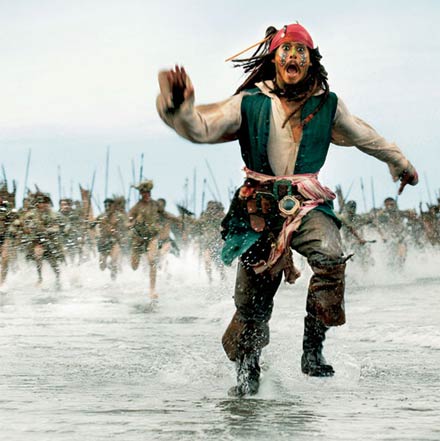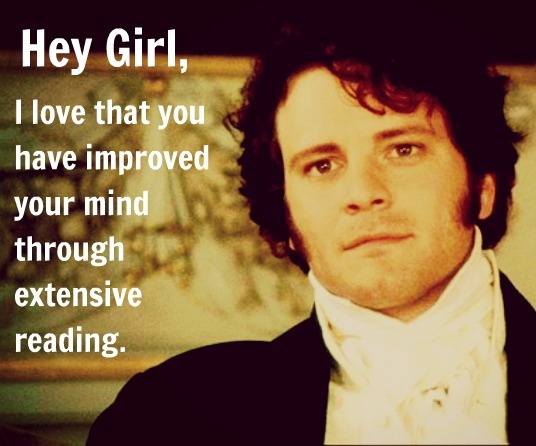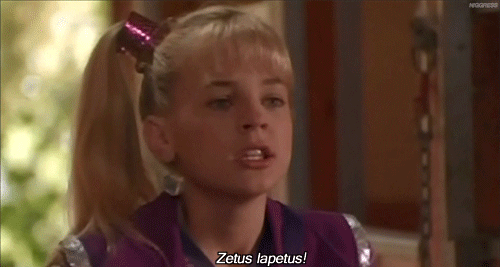Friday revolved around organization, a skill that's always been a sticky spot for me. My entire family suffers from pretty severe ADHD: Inattentive Type -- the condition formerly known as ADD. Therefore, learning to keep everything in my life where I can find it, rather than shoving it all into a closet of miscellany, leaning against the door to jam it shut, and hoping for the best--that's been essential, and a constant challenge.
You can imagine, then, what a nightmare cyberspace is for me: so much room wide open, invisible, intangible, with only bookmarks to make any sense of it.
Basically, that.
That's why I leapt on Pinterest: because suddenly, I have icons and little descriptions to remind me why I saved this link. Marvelous. It also suggests ways to organize the rest of my life: household management tips, vocabulary handouts, DIY toiletries...an A-type personality's fantasy. I'll probably keep using that for my personal life. For research projects, though, I can certainly see the benefits of Diigo, and will definitely try to make use of it in my classroom.
Evernote is a whole 'nother kettle of fish.
I use it like a binder. Of fish. No, of documents, but accessible from anywhere. It's clearer and more aesthetically pleasing than Diigo, although it does have some limitations. For what I need it, though, it's perfect. I make these beautiful schedules/to-do lists, like this one (which all of you might find useful:
None of the other tools we discussed will let me do this, and I love it. I'd love to hear about what you all found most useful, too!
P.S. Apparently Macs have Podcast Capture and Podcast Publisher apps? Anyone tried them?
Saturday, 28 July 2012
Books, forever and always.
After reading James Gee's article on the merits of video games, I was impressed with his--no. I'm sorry. That's utter balderdash. I was just as skeptical as you'd expect me to be. As for Jane McGonigal's TED Talk: missie, your fictional counterpart would be appalled.
Sure, yes, let's keep open minds. Perhaps there are video games out there with genuine benefits and legitimate claims to educational influence. Perhaps I'm a brackish-tempered curmudgeon. But let's face it: all this championing of gaming is nothing more than an anxious scramble to justify the two generations we have now lost to it. I will never accept that something designed to have no connection to the real world, something that lacks analytical depth or value, something that sucks up hours, days of one's life and leaves one with nothing to show for it, stands any chance as an enrichment tool. Just...no. I refuse.
"But Sas, you're being hypocritical! You spend just as long hidden away with a book as I did hidden away with a game!" my game-devoted younger brother indignantly exclaims. True, I grant you. But I maintain that books give at least as much back as they take in. You learn about yourself, as well as about the world and time during which the book was written. You acquire more vocabulary and improve your writing skills. You can explore other cultures and places. They hone concentration and focus in a way that nothing else does. They sharpen memory. People with higher literacy levels are also three times more likely to be above the poverty level than those who don't read well. They deepen language-learning.
Video games might offer a tiny fraction of a few of those things, but you are removing yourself from the entire world. They are not connected to any reality, not even the author's, because too many people contributed for it to reveal anything about one person. They leech, with very little repayment for your attention.
"But Sas, you're being hypocritical! You spend just as long hidden away with a book as I did hidden away with a game!" my game-devoted younger brother indignantly exclaims. True, I grant you. But I maintain that books give at least as much back as they take in. You learn about yourself, as well as about the world and time during which the book was written. You acquire more vocabulary and improve your writing skills. You can explore other cultures and places. They hone concentration and focus in a way that nothing else does. They sharpen memory. People with higher literacy levels are also three times more likely to be above the poverty level than those who don't read well. They deepen language-learning.
Video games might offer a tiny fraction of a few of those things, but you are removing yourself from the entire world. They are not connected to any reality, not even the author's, because too many people contributed for it to reveal anything about one person. They leech, with very little repayment for your attention.
Friday, 27 July 2012
From the Hellmouth.
I apologize for my disappearance, compatriots; I live in the mouth of hell (not in a fun, Joss Whedon-scripted sense),
and the ever-present disease that oozes from that abyss holds me -- and my work -- hostage. I do want to take some time out from battling those demons to address our class from last Friday, though. But not how you think.
Yes, it's very imaginative that our guest used Angry Birds to engage his students in math class. Yes, I respect him for pushing the boundaries. No, I am not going to focus this week's post on any of that.
I'd much rather talk about the windows of opportunity that were flung open by Weebly. Seriously? Making an attractive, fluid website is that easy? No way.
Why am I so excited about making websites, you ask? After all, I'm Miss Quill Pen, Chalkboards Forever, Death to Technology. All true, I grant you. However, I accept that the future is here, Zenon: Girl of the 21st Century
has tazered Felicity: An American Girl,
and I need to find my place in this. Let's preserve at least some aesthetics, though.
Are any of you familiar with Edline? It's"the first truly integrated website communication platform for K-12 school districts and their learning communities," according to their website, and it certainly has its merits, despite its frequent glitches. Bottom line, though, it's ugly. It is the taupe=walled office cubicle of websites, an ultra-utilitarian administrator's approach to the digital age. It looks old and boring, no matter how efficient it might be. I would love to design my own answer to that on Weebly. Beautiful fonts, color schemes, layouts. Salient photos, videos, and links. A page that includes regularly updates assignment prompts and a copy of the syllabus. A page of resources (MLA Citation Guide; the OED; etc.). A page of pertinent miscellany: news articles, podcasts, memes (check out possible examples in the follow-up post), comic strips, all that. Maybe the welcome page would feature a word of the day, which students would correctly use in class for extra credit.
Totally better than video games, right?
And in closing, because Buffy is a brilliant show:
and the ever-present disease that oozes from that abyss holds me -- and my work -- hostage. I do want to take some time out from battling those demons to address our class from last Friday, though. But not how you think.
Yes, it's very imaginative that our guest used Angry Birds to engage his students in math class. Yes, I respect him for pushing the boundaries. No, I am not going to focus this week's post on any of that.
I'd much rather talk about the windows of opportunity that were flung open by Weebly. Seriously? Making an attractive, fluid website is that easy? No way.
Why am I so excited about making websites, you ask? After all, I'm Miss Quill Pen, Chalkboards Forever, Death to Technology. All true, I grant you. However, I accept that the future is here, Zenon: Girl of the 21st Century
has tazered Felicity: An American Girl,
and I need to find my place in this. Let's preserve at least some aesthetics, though.
Are any of you familiar with Edline? It's"the first truly integrated website communication platform for K-12 school districts and their learning communities," according to their website, and it certainly has its merits, despite its frequent glitches. Bottom line, though, it's ugly. It is the taupe=walled office cubicle of websites, an ultra-utilitarian administrator's approach to the digital age. It looks old and boring, no matter how efficient it might be. I would love to design my own answer to that on Weebly. Beautiful fonts, color schemes, layouts. Salient photos, videos, and links. A page that includes regularly updates assignment prompts and a copy of the syllabus. A page of resources (MLA Citation Guide; the OED; etc.). A page of pertinent miscellany: news articles, podcasts, memes (check out possible examples in the follow-up post), comic strips, all that. Maybe the welcome page would feature a word of the day, which students would correctly use in class for extra credit.
Totally better than video games, right?
And in closing, because Buffy is a brilliant show:
Sunday, 15 July 2012
My first faculty meeting.
I've never really been a "group person." Big parties, team sports, group activities in class, Girl Scouts...never really my thing. I never found I could really trust the people with whom I was expected to work, despite the countless trust exercises we were force-fed on orientations or camping trips; either they didn't do their share of the work, or their ideas were stupid, or they just wanted to goof off, or they were too competitive. I prefer working in pairs or alone.
You can imagine, then, how wary I was of pulling together with five other aspiring Humanities teachers on Friday, all trying to determine the best course of action for turning the news of Mayor Bloomberg's soda ban into a lesson plan. Let's face it: you don't become a teacher because you're not strong-minded or opinionated and don't have ideas about how to implementing those opinions. Faculty meetings are a prospect that makes me rather nervous; how could we all possibly come to an agreement that pleased us all?
I'll admit we did have some moments of tense frustration. I'll own that. But on the whole, we were fine. We all brought our own concepts to the table, and all really liked certain possibilities for projects and time frames. When we were trying to narrow it down to one definitive option, that's when we got most anxious; eventually, though, someone had the game-changing idea of not settling.
We all liked the base. We knew we wanted this project to help our students develop their analytical and evaluative skills, that they might form an opinion about a current event. We knew we wanted it to develop their oral language and persuasive writing skills, that they might be able to articulate that opinion. And we knew we wanted it to develop their research skills, that they could properly support it. We also knew that this project should teach them how to use wiki pages or blogs as tools, not merely toys: forums for evaluation and discussion, rather than just places to play or whine.
There was also a framework for how we might accomplish those goals. We'd start out by telling our students to "Go find," meaning they'd each need to go dig up one article that somehow related to the soda ban and then post it on a blog or wiki page we could all access. Together, we would then evaluate what makes them credible or not, to practice evaluating sources. From there, we would move into the meat of the project: a brainstorming activity for developing interview questions, informed by the articles they'd all found. "Interview questions? Interviewing whom?" you might ask, and right you are. Well, this is an ideal world in which we could easily get whomever we wanted to agree to an interview via Skype or, if we preferred a panel discussion, a Google+ Hangout. So, we might get a street vendor, an FDA representative, an intern from Mayor Bloomberg's office, a random consumer...whomever would be a relevant subject. They could be interviewed by the entire class at once, or they could divide into groups and each interview one subject; whatever the teacher preferred. (See how we started leaving choice open? Too much conflict was brewing for us not to do so.) After the interview(s), teachers would model a Letter to the Editor or op-ed in class, and then let the students write their own, either as homework or in class, depending on the decided time frame. These pieces would also be posted as blog entries or wiki pages. Finally, students would respond to these letters, possibly from the viewpoints of the interviewees. For a shorter project, though, a teacher might decide to cut out the interviews and have the op-eds be based on the cumulative class research alone, which would be accessible via the wiki page.
Deciding on a framework, rather than a concrete, nailed-down assignment, made me feel much more comfortable. Talking together opened up new possibilities, which I still felt free to explore without getting too far away from what other English classes in my school might be doing. If this is what faculty meetings are like, I'll be happy.
I was equally apprehensive about and equally surprised by the second half of class: podcasting. Truth be told, I barely knew what a podcast was. Something to do with audio? Kind of like a radio show, right? Wouldn't this be more of a distraction than anything else, when used in class? Yes, it was fun, and Meg and I spent a relishable hour coming up with our practice podcast (listen below!!). However, it also made me consider things that had never occurred to me before. For instance, using Google Voice for homework: students call in, leave their name, and read aloud the sonnet they just composed for homework (or something), and you listen at your leisure and grade them. I love that idea, just like I love the idea of them using a blog or wiki page to post reading responses so they can access each other's ideas outside of class as well as during.
Maybe this technology stuff isn't all bad.
You can imagine, then, how wary I was of pulling together with five other aspiring Humanities teachers on Friday, all trying to determine the best course of action for turning the news of Mayor Bloomberg's soda ban into a lesson plan. Let's face it: you don't become a teacher because you're not strong-minded or opinionated and don't have ideas about how to implementing those opinions. Faculty meetings are a prospect that makes me rather nervous; how could we all possibly come to an agreement that pleased us all?
I'll admit we did have some moments of tense frustration. I'll own that. But on the whole, we were fine. We all brought our own concepts to the table, and all really liked certain possibilities for projects and time frames. When we were trying to narrow it down to one definitive option, that's when we got most anxious; eventually, though, someone had the game-changing idea of not settling.
We all liked the base. We knew we wanted this project to help our students develop their analytical and evaluative skills, that they might form an opinion about a current event. We knew we wanted it to develop their oral language and persuasive writing skills, that they might be able to articulate that opinion. And we knew we wanted it to develop their research skills, that they could properly support it. We also knew that this project should teach them how to use wiki pages or blogs as tools, not merely toys: forums for evaluation and discussion, rather than just places to play or whine.
There was also a framework for how we might accomplish those goals. We'd start out by telling our students to "Go find," meaning they'd each need to go dig up one article that somehow related to the soda ban and then post it on a blog or wiki page we could all access. Together, we would then evaluate what makes them credible or not, to practice evaluating sources. From there, we would move into the meat of the project: a brainstorming activity for developing interview questions, informed by the articles they'd all found. "Interview questions? Interviewing whom?" you might ask, and right you are. Well, this is an ideal world in which we could easily get whomever we wanted to agree to an interview via Skype or, if we preferred a panel discussion, a Google+ Hangout. So, we might get a street vendor, an FDA representative, an intern from Mayor Bloomberg's office, a random consumer...whomever would be a relevant subject. They could be interviewed by the entire class at once, or they could divide into groups and each interview one subject; whatever the teacher preferred. (See how we started leaving choice open? Too much conflict was brewing for us not to do so.) After the interview(s), teachers would model a Letter to the Editor or op-ed in class, and then let the students write their own, either as homework or in class, depending on the decided time frame. These pieces would also be posted as blog entries or wiki pages. Finally, students would respond to these letters, possibly from the viewpoints of the interviewees. For a shorter project, though, a teacher might decide to cut out the interviews and have the op-eds be based on the cumulative class research alone, which would be accessible via the wiki page.
Deciding on a framework, rather than a concrete, nailed-down assignment, made me feel much more comfortable. Talking together opened up new possibilities, which I still felt free to explore without getting too far away from what other English classes in my school might be doing. If this is what faculty meetings are like, I'll be happy.
I was equally apprehensive about and equally surprised by the second half of class: podcasting. Truth be told, I barely knew what a podcast was. Something to do with audio? Kind of like a radio show, right? Wouldn't this be more of a distraction than anything else, when used in class? Yes, it was fun, and Meg and I spent a relishable hour coming up with our practice podcast (listen below!!). However, it also made me consider things that had never occurred to me before. For instance, using Google Voice for homework: students call in, leave their name, and read aloud the sonnet they just composed for homework (or something), and you listen at your leisure and grade them. I love that idea, just like I love the idea of them using a blog or wiki page to post reading responses so they can access each other's ideas outside of class as well as during.
Maybe this technology stuff isn't all bad.
Thursday, 12 July 2012
Soda on Trial
When I was in tenth grade, my famously brilliant and infamously brutal history teacher assigned us a rather unique final project in lieu of a paper at the end of each semester. In the fall, we each had to choose a side in the trial of Mansur Al-Hallaj, the tenth-century Sufi mystic and revolutionary writer executed for heresy; in the spring, we did the same for Martin Luther. We had to call expert witnesses from outside the class and everything. Normally, I dislike group projects, as it's easy for all the work to fall to one person; in this situation, every student was accountable, and because we'd each chosen our sides, we couldn't complain that we weren't interested or didn't agree with the assigned position. Each of us had a historical role (for example, for the trial of Martin Luther, I was Philip Melanchthon, his lead attorney) and had to do thorough research appropriate to that role, giving us a deeper, more meaningful and impassioned understanding of the material than if we'd just taken a test or written a paper. It made the text leap up through us, thereby making it matter. Our grade was based on our research, our drive, and our zeal, not just whether or not we'd memorized some facts.
In case you hadn't noticed yet, I'm all about zeal. My students will be passionate, by golly, or just think me mad. (Or, you know, both. Both's fine.) I look for projects that elegantly marry passion with effectiveness, and Mayor Bloomberg's recent banning of super-sized sodas and other sugary drinks has certainly gotten people up in arms. What could be a more appropriate task, then, than a trial?
I would split my students in half, letting them choose whether they wanted to argue for the soda ban or against it. Within each group, they would have to take on characters and get inside their heads by researching not just the case itself, but their own characters. That would build an appreciation for character development, as well as a broader, fuller understanding of the topic itself. By having each student focus and expand on something particular to him or her, the class will be able to cover more information and includes scaffolding (webbing, if you will): they do preliminary discussion to form a base for their defense or critique, gather their information, then bring it in to the group, then discuss what else they need, then gather more, then come back, and so on. No one would be left out, no one would be able to slack, and each student would be constructing their self-efficacy by being aware of their indispensability to the group.
In case you hadn't noticed yet, I'm all about zeal. My students will be passionate, by golly, or just think me mad. (Or, you know, both. Both's fine.) I look for projects that elegantly marry passion with effectiveness, and Mayor Bloomberg's recent banning of super-sized sodas and other sugary drinks has certainly gotten people up in arms. What could be a more appropriate task, then, than a trial?
I would split my students in half, letting them choose whether they wanted to argue for the soda ban or against it. Within each group, they would have to take on characters and get inside their heads by researching not just the case itself, but their own characters. That would build an appreciation for character development, as well as a broader, fuller understanding of the topic itself. By having each student focus and expand on something particular to him or her, the class will be able to cover more information and includes scaffolding (webbing, if you will): they do preliminary discussion to form a base for their defense or critique, gather their information, then bring it in to the group, then discuss what else they need, then gather more, then come back, and so on. No one would be left out, no one would be able to slack, and each student would be constructing their self-efficacy by being aware of their indispensability to the group.
Subscribe to:
Posts (Atom)














